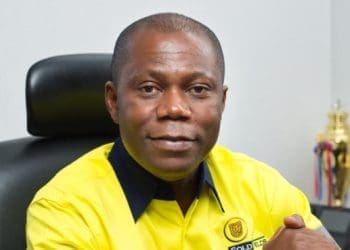The Minority in Parliament has launched a scathing attack on the Attorney General (AG), Dr. Dominic Akuritinga Ayine, over the decision to enter a nolle prosequi in the high-profile case involving former uniBank CEO Dr. Kwabena Duffour and seven others.
The discontinuation of the case, titled The Republic v. Kwabena Duffuor & 7 Others (CR/0248/2020), marks a turning point in the State’s approach to dealing with complex financial crimes arising from the 2018 financial sector clean-up.
The move does not exonerate the accused, the Attorney-General emphasised, but reflects a strategic balancing of cost, benefit, and national interest.
The Minority caucus described the move as a shocking abuse of prosecutorial powers and a dangerous precedent that undermines public confidence in the justice system.
Addressing the media in Parliament on Monday, July 28, 2025, MP for Asante-Akim Central, Kwame Anyimadu-Antwi, questioned the legal and ethical basis of the Attorney General’s decision to discontinue the case, which involved allegations of fraudulent breach of trust, money laundering, and the loss of GH¢5.7 billion in depositors’ funds.
Reading a statement on behalf of the Minority, he challenged the justification provided in the Attorney General’s July 22 press release, which cited a ‘60% recovery threshold’ as the basis for halting the prosecution.
He declared, “This is not accountability. This is abdication. The Attorney General claims that 60% of the losses have been recovered. Where is the evidence? And under what law can someone cause such monumental loss to the state, pay back a portion, and walk free without a conviction?”
The Minority also questioned how the AG arrived at the figure of GH¢1.2 billion as the total loss, implying that this administrative revaluation was done to justify the decision.
One of the more explosive claims was a potential conflict of interest surrounding the Attorney General himself.
“Did Dr. Dominic Ayine not previously act as counsel for Dr. Kwabena Duffour in this same matter?” the Minority asked.
“Now, as Attorney General, he turns around and discontinues the case. This is not just unethical, it reeks of cronyism and compromise,” he added.
The group demanded a full public disclosure of Dr. Ayine’s past legal affiliations with any of the accused persons in the case.
The Minority took particular issue with what they described as a mysterious and legally baseless 60/40 policy.
“When was this introduced into our criminal jurisprudence? Was it ever debated in Parliament? Under what authority does the Attorney General implement a policy that essentially tells economic criminals to keep 40% of what they stole?”
Referencing Section 35 of the Courts Act, 1993 (Act 459), the Minority argued that even under restitution or plea bargaining, legal processes must be court-supervised and result in some form of conviction, none of which applied in the current case.
“The Attorney General’s justification is not only deeply flawed but entirely extrajudicial. This cannot be classified as a plea bargain or restitution. It’s simply an escape route for the politically connected.”
“This is a betrayal of public Trust.”
The Minority called on several bodies to intervene immediately, urging Parliament’s Constitutional, Legal and Parliamentary Affairs Committee to summon the Attorney General.
“The Ghana Bar Association must investigate any possible ethical breaches. Civil society, religious leaders, and every Ghanaian who cares about justice must speak up,” they urged.
“This is not a political issue. This is a moral and legal crisis. The Attorney General must reverse this decision or face legal action. We will not sit back while justice is shredded in the name of convenience.”
The MP warned that the Minority is considering a legal challenge in court to overturn the decision and stressed that justice must not only be done, but it must be seen to be done.













